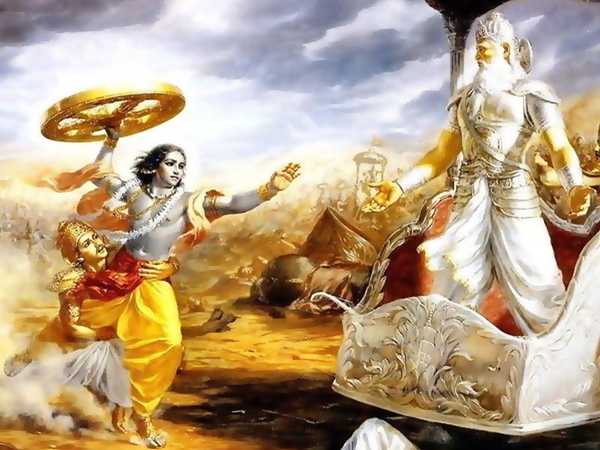Chapter 109

“Vaisampayana said, ‘Upon the birth of those three children, Kurujangala,Kurukshetra, and the Kurus grew in prosperity. The earth began to yieldabundant harvest, and the crops also were of good flavour. And the cloudsbegan to pour rain in season and trees became full of fruits and flowers.
And the draught cattle were all happy and the birds and other animalsrejoiced exceedingly. And the flowers became fragrant and the fruitsbecame sweet; the cities and towns became filled with merchants,artisans, traders and artists of every description. And the people becamebrave, learned, honest and happy. And there were no robbers then, noranybody who was sinful. And it seemed that the golden age had come uponevery part of the kingdom. And the people devoted to virtuous acts,sacrifices and truth, and regarding one another with love and affectiongrew in prosperity. And free from pride, wrath and covetousness, theyrejoiced in perfectly innocent sports. And the capital of the Kurus, fullas the ocean, was a second Amaravati, teeming with hundreds of palacesand mansions, and possessing gates and arches dark as the clouds. And menin great cheerfulness sported constantly on rivers, lakes and tanks, andin fine groves and charming woods. And the southern Kurus, in theirvirtuous rivalry with their northern kinsmen, walked about in the companyof Siddhas and Charanas and Rishis. And all over that delightful countrywhose prosperity was thus increased by the Kurus, there were no misersand no widowed women. And the wells and lakes were ever full; the grovesabounded with trees, and the houses and abodes of Brahmanas were full ofwealth and the whole kingdom was full of festivities. And, O king,virtuously ruled by Bhishma, the kingdom was adorned with hundreds ofsacrificial stakes. And the wheel of virtue having been set in motion byBhishma, and the country became so contented that the subjects of otherkingdoms, quitting their homes, came to dwell there and increase itspopulation. And the citizens and the people were filled with hope, uponseeing the youthful acts of their illustrious princes. And, O king, inthe house of the Kuru chiefs as also of the principal citizens, ‘give’,’eat’ were the only words constantly heard. And Dhritarashtra and Panduand Vidura of great intelligence were from their birth brought up byBhishma, as if they were his own sons. And the children, having passedthrough the usual rites of their order, devoted themselves to vows andstudy. And they grew up into fine young men skilled in the Vedas and allathletic sports. And they became well-skilled in the practice of bow, inhorsemanship, in encounters with mace, sword and shield, in themanagement of elephants in battle, and in the science of morality.Well-read in history and the Puranas and various branches of learning,and acquainted with the truths of the Vedas and their branches theyacquired knowledge, which was versatile and deep. And Pandu, possessed ofgreat prowess, excelled all men in archery while Dhritarashtra excelledall in personal strength, while in the three worlds there was no oneequal to Vidura in devotion to virtue and in the knowledge of thedictates of morality. And beholding the restoration of the extinct lineof Santanu, the saying became current in all countries that among mothersof heroes, the daughters of the king of Kasi were the first; that amongcountries Kurujangala was the first; that among virtuous men, Vidura wasthe first; that among cities Hastinapura was the first. Pandu becameking, for Dhritarashtra, owing to the blindness, and Vidura, for hisbirth by a Sudra woman, did not obtain the kingdom. One day Bhishma, theforemost of those acquainted with the duties of a statesman and dictatesof morality, properly addressing Vidura conversant with the truth ofreligion and virtue, said as follows.”




